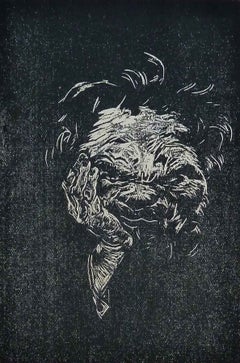Animal Portrait Prints
to
10
34
8
11
6
2
Overall Width
to
Overall Height
to
27
8
7
2
2
1
1
1
2
2
2
2
2
12
5
16
28
1
1
1
2
5
4
1
12
26
25
9
13,105
6,453
3,542
3,046
2,592
1,898
1,552
1,216
1,102
936
785
760
414
376
361
242
213
202
190
174
23
13
11
6
6
10
21
36
21
Art Subject: Animal
Uncle Vanja
Located in London, GB
FEDOR LOEVENSTEIN LOWENSTEIN 1901-1947
(Czech / French)
Title: Uncle Vanja, early 1920’s
Technique: Original Hand Signed, Inscribed and Titled Woodcut on thin wove paper
Paper Size: 27.5 x 21 cm / 10.8 x 8.2 in
Plate Size: 14.8 x 10 cm / 5.8 x 3.9 in
Additional Information: This work is hand signed in pencil by the artist "F. Loevenstein" at the lower right margin.
It is also tilted "Onkel Wanja" (Uncle Vanja) and inscribed "Handabzug" (Hand printed) in pencil at the lower left margins.
This work was printed in the early 1920's in a small edition.
Originally from Czechoslovakia, Fédor Löwenstein (Munich, 1901 - Nice, 1946) studied art in Germany before moving to Paris in 1923, attracted by its artistic influence. There he mixed with the painter André Lhote from Bordeaux and joined the Groupe des Surindépendants in 1936.
His style evolved from Cubism to a form of Romantic abstraction. In 1938, he painted La Chute (The Fall), inspired by the signing of the Munich Agreement ratifying the dismantling of the Czechoslovakia created in 1918. France’s entry into the war drove him to leave the capital for Mirmande, a ruined village in the Drôme region, where Lhote held a summer academy. Löwenstein then divided his time between Mirmande and Nice where his mother and sister lived, but had to take refuge for a time in the Abbey of Aiguebelle. He fell ill in the autumn of 1943 and went to Paris to see a doctor; he died in Nice in 1946.
Exhibited: Fédor Lowenstein...
Category
1920s Cubist Portrait Prints
Materials
Paper
